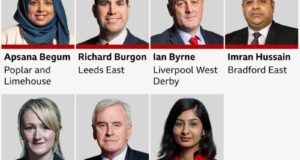
Some Conservative members have been issued with more than one ballot paper to vote for the next party leader and prime minister, the BBC has learned.
One party insider estimated that more than a thousand voters could be affected.
Members are warned that voting twice will mean they are expelled, the Conservatives said.
Meanwhile, Boris Johnson will unveil his crime policy while Jeremy Hunt will say it is time for serious leadership.
Ballot papers have been dispatched to around 160,000 Conservative Party members around the country to choose between Mr Johnson and Mr Hunt as the next leader – and the next prime minister.
The vote closes on 22 July, with the result announced the following day.
BBC Radio 4’s Today Programme has learned that some members have received two ballot papers, in some cases because members live and work in different constituencies and may have joined local Conservative Associations in both areas.
People who have changed their name, after marriage for example, may also have been affected.
The BBC has also seen duplicate ballot papers which have been issued to the same person at the same address.
The Conservative Party and the independent body hired to scrutinise the running of the leadership election were both unable to say how many ballot papers had been sent in error.
“The ballot holds clear instructions that members voting more than once will be expelled,” the party said.
Sir Patrick McLoughlin, who is chairing Mr Hunt’s leadership campaign, admitted that he also gets two ballot papers as he is on two separate registers.
“It doesn’t mean I vote twice, I don’t,” he told the Today programme.
Asked whether the duplicate ballots need to be more heavily policed, he said: “It’s right there on the ballot paper saying you must only vote on one occasion and I expect people to do that.”
Mr Johnson’s campaign chairman Iain Duncan Smith said he believed the Conservative Party chairman had “already been asked to look carefully at how they sift” ballots.
In most elections, voting more than once would be illegal, but the leadership contest is only governed by the Conservative Party’s internal rules.
The Electoral Commission, the independent body which oversees UK elections to ensure their integrity, has no role in the leadership contest.
As they seek to win support from the party’s members nationwide, both candidates will address the Young Conservatives Conference in Nottingham on Saturday.
Mr Johnson will set out a plan to reduce crime by permanently restoring stop and search powers nationwide. They were restricted by Theresa May as home secretary in 2014. These powers have already been restored in seven areas with high knife crime on a trial basis.
pledged to leave the EU on 31 October “come what may, do or die”
He also plans to end the early release of violent offenders and address the causes of crime with a review of youth centre provision.
Speaking to the Today programme Mr Duncan Smith said police needed to be given “the capabilities to do their job” as well as increasing police numbers.
When asked how Mr Johnson intended on funding 20,000 extra police officers, he said: “We’ve had to put the economy right from the terrible Labour crash that took place in 2007, but we are very much now back on track.”
But Labour’s shadow policing minister Louise Haigh dismissed Mr Johnson’s policies as “fairly meaningless, cheap headline grabbing measures”.
Mr Hunt had a clear “10 point plan” on how he would tackle Brexit
Mr Hunt will tell the conference “we are in a time of real and present danger to our country” which calls for “competence, delivery and serious leadership”.
“It’s time to make a hard choice for the future not a feel-good one for the summer,” he will say.
Sir Patrick said a “broad brush of people right across the whole party” have come out to support Mr Hunt.
He added that the foreign secretary was not wedded to leaving the EU by the “magical deadline” of 31 October, which he says is a “do or die” issue for frontrunner Mr Johnson.
He said Mr Hunt’s “10 point plan very clearly” set out his plan for leaving the EU.
Sir Patrick said: “By the end of September he would decide, along with the Cabinet… whether we move forward with no deal or whether there was a chance of getting a deal”.
On Mr Hunt’s well-publicised comments on a vote on lifting the ban on fox hunting, Sir Patrick said he “merely stated what the manifesto commitment was” in 2017, and that fox hunting laws were not going to change in this Parliament.
Mr Duncan Smith said the British public were “betrayed” when the UK did not leave the EU on 29 March, and added: “If you don’t get the message now that we don’t deliver then we end up in a real crisis on 31 October.”
 Weekly Bangla Mirror | Bangla Mirror, Bangladeshi news in UK, bangla mirror news
Weekly Bangla Mirror | Bangla Mirror, Bangladeshi news in UK, bangla mirror news







